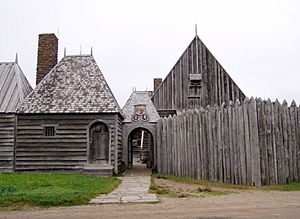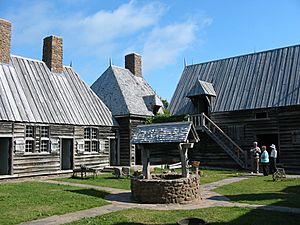Port-Royal National Historic Site facts for kids
Quick facts for kids Port-Royal National Historic Site |
|
|---|---|

The entrance into the replica of the Habitation at Port-Royal.
|
|
| Location | 53 Historic Lane, Granville Ferry, Nova Scotia |
| Area | 1 hectare (2.5 acres) |
| Built | 1605-1613 |
| Governing body | Parks Canada |
| Lua error in Module:Location_map at line 420: attempt to index field 'wikibase' (a nil value). | |
| Official name: Port-Royal National Historic Site of Canada | |
| Designated: | May 25, 1923 |
Port-Royal National Historic Site is a special place in Nova Scotia, Canada. It is located on the north side of the Annapolis Basin in Granville Ferry. This site is where the Habitation at Port-Royal once stood. This Habitation was a very important settlement for the French colony of New France in a region called Acadia. It was active from 1605 to 1613. English forces from the Colony of Virginia later destroyed it.
Contents
Exploring the History of Port-Royal
The French colony of Port Royal was the first successful European settlement in what is now Canada. The Habitation was the main part of this colony. It was active from 1605 to 1613. Even though the larger Port Royal settlement continued, the Habitation itself was destroyed in 1613. This ended its role as the colony's main center.
In 1629, Scottish settlers built a new fort called Charles Fort. This fort is now known as Fort Anne. The new fort became the main hub for the Port Royal colony. The area around this new fort grew into the modern town of Annapolis Royal.
Bringing History to Life: The Replica Habitation
On May 25, 1925, the Historic Sites and Monuments Board of Canada recognized the original Habitation as very important. It was then named Port-Royal National Historic Site.
In the 1930s, people found the exact spot where the original Habitation stood. Archaeological excavations, which means digging up old things, made people more interested in the early French settlement.
In the early 1900s, people from Nova Scotia wanted to rebuild the Habitation. They asked the Government of Canada to create a replica. This replica would look just like the original building from 1605 to 1613.
The government agreed to build the replica on the original site. Construction happened from 1939 to 1941. The builders used old plans for the original Habitation that were found in France. This was the first time a replica structure was built at a National Historic Site.
Today, this replica is a key part of Port-Royal National Historic Site. It helps visitors learn about this important historical area. The replica is now seen as a major achievement in preserving national heritage.
Visiting Port-Royal National Historic Site Today
Parks Canada operates the site. It is open to the public as part of Canada's national park system. You can find historical interpreters there who dress in old-fashioned costumes. They show visitors what life was like in the early 1600s. They demonstrate activities like farming, building, cooking, and fur trading. They also share information about the Mi'kmaq people, who lived in the area for thousands of years. It's a popular place for tourists to visit.
Images for kids
See also
 | Precious Adams |
 | Lauren Anderson |
 | Janet Collins |






